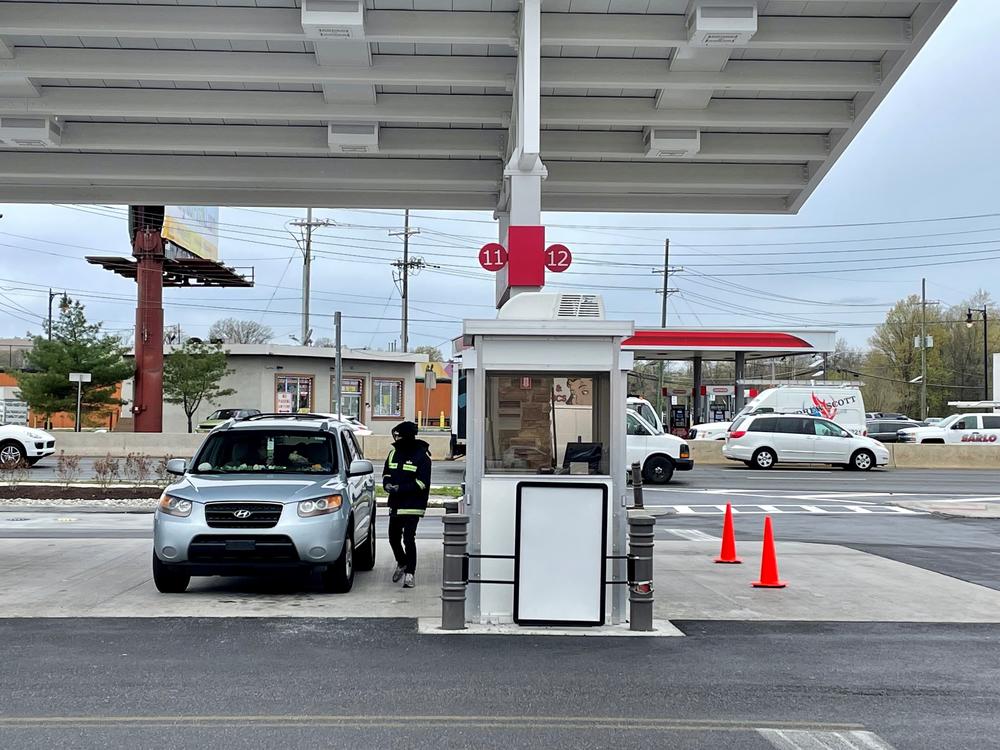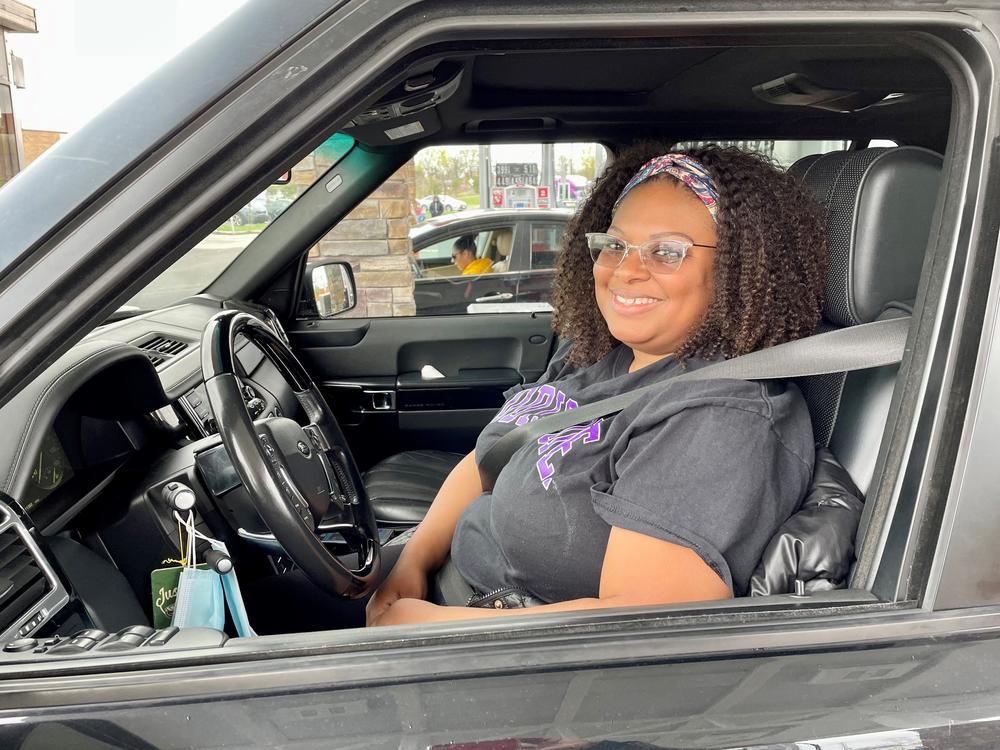Section Branding
Header Content
Amid high gas prices, N.J. weighs lifting its self-service gas ban
Primary Content
At a small gas station in South Jersey, Shaphin Poirier sat in her car as an attendant finished filling up her tank.
While she knows how to pump her own gas, "Do I want to? No," said Poirier. She gestured to the cold April drizzle outside.
Of New Jersey's 73-year-old ban on pumping your own gas, "I like it just the way it is," Poirier said.
New Jersey and Oregon are the only two states where drivers cannot legally serve themselves gasoline, although the Oregon ban is relaxed in rural areas. In both, legislators introduced bills this year that would change that.
In the Garden State, the "Motorist Fueling Choice and Convenience Act" would allow all gas stations to offer self-service. Those with more than four pumps would still be required to have a full-service option between 8am and 8pm. The bill would also allow stations to lower the price for customers who pump their own gas. Oregon's bill did not make it out of committee before this year's short legislative session ended.
In New Jersey, gas station owners argue the move would help ease a labor shortage and bring prices down, but many drivers and politicians remain wary of changing a practice that has become a point of pride.
"Every day is a predicament whether the employee will show up or not," said Roger Verma, who owns 11 gas stations in Pennsylvania and New Jersey.
COVID-19 has made an already difficult to fill job much harder, said Sal Risalvato, executive director with the New Jersey Gasoline-Convenience-Automotive Association.
"I have members on busy highways that they have to close, sometimes during the day for a couple of hours because a shift ends, and they don't have anybody to cover it," he said.
Gas station employment dropped steeply at the beginning of the coronavirus pandemic but has largely bounced back, according to the Bureau of Labor Statistics, although the return is not as robust once you remove supervisors from the picture.
Risalvato, whose group backs the new bill, knows the measure faces stiff opposition. His group pushed for the ban in the first place many years ago.
"It became a source of pride."
In the late 1940s, a gas station owner in Hackensack began allowing drivers to help themselves, lowering his prices from 22 cents a gallon to 19 cents, according to the Association.
"His gas station competitors were up in arms because he was stealing all their customers," said Risalvato, so they ran to his group, which successfully lobbied the legislature to ban the practice.
Periodically, efforts to lift the ban arose, including multiple times in the 1980s as gas prices increased sharply after the 1979 oil crisis and remained higher on average, according to the U.S. Department of Energy.
The late state Sen. Gerald Cardinale frequently championed the cause of self-service, including in a 1981 New York Times op-ed, where he addressed common arguments against pumping your own gas, for example that it was too dangerous.
"The executive director of the state's Gasoline Retailers Association has stated that he is concerned about unthinking consumers burning themselves to death because they would be likely to pump gasoline while smoking. Insurance companies disagree," he wrote, noting that insurance premiums for full-service and self-service stations are about the same.
These efforts failed and independent gas station owners remained opposed to the change, fearing it would give oil companies that owned many larger filling stations too much power, according to hearing testimony. Other concerns included accessibility for drivers with limited mobility, and the safety of pumping your own gasoline at night.
For years, New Jersey drivers also enjoyed cheaper gas prices than their neighbors, due to lower than average gas taxes. Full-service gas at a low price became a part of the culture, with swag to boot, said Risalvato.
"The bumper sticker, and the T-shirts [saying], 'Jersey Girls don't pump gas.' And it became a source of pride," he said.
In 2016, that started to change. Then-Gov. Chris Christie raised the gas tax for the first time since 1988. New Jersey now has some of the highest gas taxes in the country, according to the American Petroleum Institute. Gas price data from AAA shows Garden State drivers pay a few cents less than the national average.
If self-service were allowed, New Jersey gas station owners predict they could afford to lower prices at the pump from 7 to 23 cents a gallon, according to a survey by the New Jersey Gasoline-Convenience-Automotive Association.
Verma, the franchise owner, said he understands why residents might be skeptical that would actually happen. But if just one station drops their price for self-service gas, others will follow suit, he said. "Competition will take care of it automatically. The prices have to come down."
"A political third rail"
So far, the Garden State's top politicians haven't embraced the bill — though they haven't completely ruled it out either.
"Self-service gas, that's been a political third rail in New Jersey, which I have historically not crossed," said Democratic Gov. Phil Murphy at a press briefing after the bill was announced. But he left open the possibility of backing the bill if it could make life in New Jersey more affordable for residents.
"Given that gas prices on average have now gone over $4 a gallon ... I need to understand what impact it would have," he continued.
Before getting to the governor's desk, the bill will have to win over Senate President Nicholas Scutari to have a shot at passing.
"At this time, I do not support the self-serve proposal," Scutari said in a statement. "However, if the public sentiment changes or there is in fact data showing that it would dramatically reduce costs, I would reconsider."
Public opinion varies, according to two recent polls. A March 9 poll by Rutgers-Eagleton found 73% of respondents preferred someone else pump their gas. But a subsequent Monmouth University poll found that a majority of New Jersey residents, 54%, would support self-service fueling as long as gas stations still kept an attendant on-duty to provide full-service. That same survey found 70% would choose to pump their own gas if it cost 15 cents less per gallon than the full-service price.
Kay Robinson said she worries about putting attendants out of work, as she waited for her husband to emerge from a Camden County convenience store. Many of her friends pumped gas when she was growing up.
"I don't know what it pays now, but it was a good job back then," said Robinson. "Where are they going to go now?"
NPR approached several attendants, none of whom agreed to be quoted on-the-record. Some had not heard about the bill. Of those who had, some believed it could hurt their employment, while others said it was likely they would just be moved into a different gas station job.
Robinson said she has noticed many stations with closed lanes due to a lack of employees. In that case, they should have the option to let customers pump, but only if full-service is still available. Of the new bill, Robinson said: "I don't like it."
Getting rid of full-service stations would change how she feels about living in the Garden State, she said.
Copyright 2022 NPR. To see more, visit https://www.npr.org.


